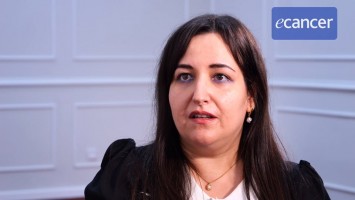3rd Immunotherapy of Cancer Conference (ITOC3)
Biomarkers in t-cell therapy trials
Dr Jérôme Galon - Laboratory of Integrative Cancer Immunology, Paris, France
Today I will talk about biomarkers, both prognostic and predictive biomarkers, especially in response to immunotherapy. So my lab has been working since many years on the deep characterisation of the tumour microenvironment and we found some very interesting biomarkers that can predict the likelihood of response to treatment, the likelihood of having the tumour recurrence, you can predict patients with long-term survival.
Did you work with any biomarkers in particular?
We have been mostly focussing on really characterising the immune infiltrates within human tumours, so looking, basically, at all the immune cell subpopulations within human tumours. We analyse what we call the immunome, that is the genes that are specific for every immune cell subpopulation. So we analyse many, many different cell subpopulations, immune cell subpopulations infiltrating the tumours. We found out that the adaptive immunity, and in particular the memory T-cells, were essential to predict long-term survival. More strikingly, what we found in the paper that we published in Science was that in fact the tumour progression and the tumour invasion, the tumour aggressiveness, all the classical parameters of tumour staging, are in fact dependent on the host immune response and on the cytotoxic memory T-cells that are present within the tumour which, of course, change a lot the paradigm of how we see a cancer. Now that we have immunotherapies that can modulate these T-cells that we have characterised of course this has a huge impact on the patients.
Have you published any specific results on individual markers?
Sure. We have published both in The New England Journal of Medicine or in Science or in The Journal of Clinical Oncology papers around the importance of the adaptive immune cells, the Th1 markers like TBX21, chemokines, so signatures with chemokines that were published. Of course the memory T-cells that we published initially back in The New England Journal of Medicine. We had these studies looking at either early stage patients, even at early stage patients these immune cells are very important to predict the patients at high risk of tumour recurrence, even though they have an early stage small tumour. In the opposite, or likewise, for patients with very late stage metastasis like brain metastasis, when analysing these cells, these immune cells, with an assay that is called the immunoscore assay, this is a standardised immune assay that we developed, this has a very strong prognostic value in stratifying patients with long-term survival in brain metastasis. That was published this year.
How does your research relate to biomarkers such as PD-L1?
We actually wrote a review published in Immunity about this topic and there is a strong relationship between some aspect of the immune response to cancer and some of those immune markers that have both a prognostic value and a predictive value of response to treatment and, in particular, of response to immunotherapy. This has to do with the fact that the patients that have long-term survival, that are protected against tumour recurrence, need to generate a T-cell adaptive immunity, they need to generate a memory T-cell response. To generate this type of response there is the need to have a Th1 type of response with interferon gamma which upregulates these checkpoint receptors. So these markers like PD-L1, the expression of PD-L1, has been shown to be a predictive biomarker of response. But it’s not only PD-L1, it’s in fact the adaptive immunity, the Th1 response, the densities of the cytotoxic T-cells that goes along with PD-L1 expression that has been nicely associated with response and prediction of response to immunotherapies like anti-PD1 treatment. So there is a paper published by a group from published in Nature showing that the densities of the CD8 T-cells at the invasive margin of the tumour in particular are very powerful in predicting the responders, the patients responding to anti-PD1.
Which biomarkers do you think researchers should be paying close attention to?
Of course immunoscore is the most advanced because it’s a standardised assay and it’s now undergoing a massive international validation with 23 centres across the globe all testing immunoscore with standardised operating procedures with the same standardised assay on their patients, so in all the countries from Asia to the US, Canada and Europe. So we expect the results now to come very soon so this very large consortium, international consortium, that is currently testing in the same way an immune biomarker will make things change into how cancer patients are classified because today worldwide there is absolutely no immune markers that are used in the clinic to tell something about the immune response of a cancer patient, there is none. Nothing is done in routine; there are some that are done in research or some in some clinical trials but nothing in routine yet. So we hope that this will open the door, basically, to immune biomarkers in the field of cancer.








